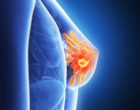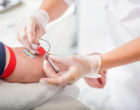
September is National Childhood Cancer Awareness Month, a time to recognize issues facing children with cancer. Several new developments in childhood cancer research at the National Cancer Institute (NCI) and other institutions hold promise for accelerating the development of new treatments, and emphasize the importance of sharing data.

Childhood cancers are rare, with less than 16,000 diagnoses yearly in children and adolescents in the US.
Leukemia is the most common type of pediatric cancer, affecting less than 4000 yearly, whereas very rare childhood cancers affect less than 200 yearly.

Compared to over 20,000 breast cancer patients who participated in trials leading to approval of tamoxifen treatment, it is clear that testing drugs for any kind of childhood cancer is particularly difficult.
Despite the low number of childhood cancer patients, children with cancer are 20 times more likely to participate in clinical trials than adults, often enrolling in multiple trials. The recent RACE for Children Act promotes the development of clinical trials of new molecularly-targeted therapies to help children with cancer get earlier access to new drugs.
Unfortunately, families enter trials with no guarantee that their child will benefit directly. It is therefore imperative that results of all trials be used to find new treatments. The high participation rate of children in trials represents a tremendous opportunity for scientists to learn more about childhood cancer and develop new treatments.
The high participation rate of children in trials represents a tremendous opportunity for scientists to learn more about childhood cancer and develop new treatments.
It can be difficult, though, to use data from childhood cancer clinical trials. The existence and location of biospecimens collected in trials may not be well documented, so scientists wanting to study a certain cancer may not be able to find samples they need. Data is stored and collected differently at many institutions, making it hard to combine smaller studies into larger cohorts of data. Studies may focus on collecting different kinds of data or may not adequately document how data was collected. To combat these problems, NCI is working on several new initiatives to make research on childhood cancers easier in the future.
 MyPART: My Pediatric and Adult Rare Tumor Network
MyPART: My Pediatric and Adult Rare Tumor Network
As part of the NCI Cancer Moonshot, the NCI Center for Cancer Research has established a patient engagement network called MyPART for patients, families, advocates, clinicians, and researchers working together to improve the lives of young people with cancer. MyPART focuses on rare solid tumors affecting people age 39 and younger. A study was opened this year for patients to share their clinical, imaging, and molecular data, as well as their clinical trial history. Patients can participate from home or by visiting the NIH Clinical Center for more detailed treatment recommendations. In this way, MyPART gathers diverse outcome data on patients across their treatment history.

MyPART also holds clinics bringing together patients and clinicians from around the world to focus on specific cancers. Since most clinicians see very few rare cancer patients, these clinics allow them to compare many patients and learn from their colleagues’ experiences. Similarly, MyPART hosts research workshops bringing together scientists to exchange ideas.
Finally, MyPART collects biospecimens from young people with rare tumors and performs molecular analyses looking for new outcome markers and treatment targets. MyPART is fully committed to sharing data and biospecimens while protecting patient privacy, enabling new research on childhood cancers.
Enhancing biobanking for childhood cancers
 NCI recently held a workshop bringing together stakeholders in biospecimen collection and biobanking for cancers in young people. The Childhood Cancer Survivorship, Treatment, Access and Research (STAR) Act of 2018 set goals to enhance biospecimen collection during clinical trials, emphasizing selected cancer subtypes with the least effective therapy. The purpose of enhanced biospecimen collection is to help scientists understand why treatments don’t work. The workshop focused on challenges and opportunities for banking children’s tumors and highlighted existing programs.
NCI recently held a workshop bringing together stakeholders in biospecimen collection and biobanking for cancers in young people. The Childhood Cancer Survivorship, Treatment, Access and Research (STAR) Act of 2018 set goals to enhance biospecimen collection during clinical trials, emphasizing selected cancer subtypes with the least effective therapy. The purpose of enhanced biospecimen collection is to help scientists understand why treatments don’t work. The workshop focused on challenges and opportunities for banking children’s tumors and highlighted existing programs.
Providing researchers with greater access to data will help answer difficult questions and accelerate our ability to develop less toxic, more effective treatments and better outcomes.
Childhood Cancer Data Initiative
Most recently, the NCI hosted a symposium for experts to explore ways of improving outcomes for children with cancer by enhancing the sharing and use of data. The Childhood Cancer Data Initiative (CCDI) was launched to speed up progress in cancer research for young people. Providing researchers with greater access to data will help answer difficult questions and accelerate our ability to develop less toxic, more effective treatments and better outcomes.
Because of inherent difficulties in collecting and accessing data across multiple studies and institutions, a dynamic infrastructure that connects existing databases is needed to make it easier to find and use data. As more computing and data storage becomes cloud-based, opportunities are ripe for developing tools and methods enabling data sharing and knowledge extraction. The NCI is counting on commitment from the entire pediatric cancer research community to share data they have available and to continue adding to this rich resource.
Children are taught to share from a young age. Barriers to sharing in medical research include structural, logistical, and cultural factors. National Childhood Cancer Awareness Month is a great time to re-evaluate which barriers are real and which are perceived, and dedicate ourselves to lowering barriers to finding cures for children with cancer.
Comments